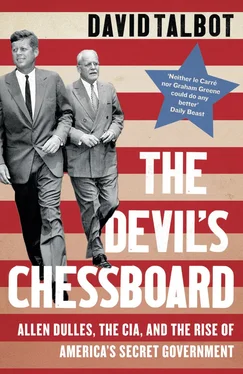Those who snubbed him at the clubhouse in Tuxedo Park—a rolling estate of woods, lakes, and citadels for America’s gentry located in Orange County, New York, some forty miles outside of New York City—were too stupid, in Pell’s not-so-humble opinion, to realize that Franklin Roosevelt was trying to save their bacon from a revolution that was rumbling right outside their gates. “ I am almost the last capitalistwho is willing to be saved by you,” Pell wrote Roosevelt in 1936 in a letter beseeching the president to draft him for the New Deal cause. The following year, Pell wrote again, praising FDR’s accomplishments: “ Your administration has made possiblethe continuance of American institutions for at least fifty years. You have done for the government what St. Francis did for the Catholic Church. You have brought it back to the people.”
Roosevelt finally did put Pell to work, sending him to Portugal and then to Hungary as U.S. ambassador in the late 1930s, from where he watched with growing alarm the rise of fascism. By the time Pell was chosen for the war crimes commission in June 1943, he knew the full depths of the evil that had taken hold of Europe. He was eager to get to London, where other commission members were already beginning to meet, but Pell found himself ensnared by State Department bureaucracy. His principal nemesis was the State Department legal adviser, a fussy and officious man named Green Hackworth.
The two men clashed immediately, on a personal as well as political level. “ Hackworth was well named,” Pell recalled later. “He was a little, legal hack of no particular attainments. He was manifestly not born a gentleman and had acquired very few of the ideas of a gentleman on his way up in the world. His manners were bad, his fingers were dirty [and] he was clearly unused to good society.”
More important, Pell’s mission abroad was strongly opposed by Hackworth, who took a narrowly legalistic approach to the war crimes question. War was not subject to a moral calculus, in the eyes of State Department officials like Hackworth, who rejected the very idea that the international community might hold heads of state responsible for atrocities against their own people. This traditional view was rendered obsolete by the Nazi inferno in Europe, but men like Hackworth seemed oblivious to the new world around them.
Pell, in contrast, was intent on bringing to justice not just Nazi Party high officials, but also the German business elite who had profited from Hitler’s rule and even the rank-and-file Gestapo men who, unless they were severely punished, Pell feared, would go home to their villages and brag about what they had gotten away with. “The first thing is to make clear to every last German in the worldthat war is not a profitable business,” Pell wrote to Secretary of State Hull in 1943. Pell’s zeal for justice—and his broad definition of German guilt—sent alarms through the U.S. Foreign Service and Wall Street circles, where the primary concerns were related to postwar German stability.
Green Hackworth and his colleagues successfully conspired to hold up Pell’s departure for months. Finally, after FDR intervened on his behalf with Hull, Pell was able to set sail for London on the Queen Mary in December 1943—a full six months after his appointment to the war crimes commission. Pell arrived in a frigidly cold, war-torn London, where heating fuel was in short supply. Fortunately, he had sent word ahead to his English tailor, who was able to supply him with woolen long underwear that fit his large frame.
Pell was shocked by London’s widespread war damage: every block seemed to have at least one demolished building. Three of the friends in his small London social circle were killed by German bombs. One was blown up, along with the rest of the congregation, while attending Sunday church. Only the minister survived. Pell toughed it out during air raids, staying aboveground instead of descending into the crowded, badly ventilated shelters. At age fifty-nine, he thought he was more likely to die from catching the flu than by being blown up by a German bomb or a Doodlebug, as the British called the V–1 flying bombs whistling overhead. When the Luftwaffe bombers roared over London, they dropped huge flares to illuminate their targets, and the city was cast in a spectral glow just before the explosions began. As the president’s man in London, Pell thought it was important to carry on with his life in the same plucky manner as the Brits. One afternoon, he took a visiting cousin for tea at the exclusive Athenaeum Club. Although every one of the club’s windows had been blasted out, the waiters still made their rounds with the same crisp and aloof manner as they had before the war.
As the war crimes commission went about its work through 1944, Pell, despite his lack of legal experience, took a leadership role, developing prosecutorial guidelines for the postwar tribunal that would try Germany’s war criminals. While some commission members were uncertain how to categorize the Nazi brutality against the Jews, Pell vehemently argued that this violence, even if conducted away from the battlefield, must be regarded as a prosecutable war crime, and the commission came to agree with him.
But Pell was unable to finish his work with the war crimes commission. In December 1944, he returned to America for the wedding of his only son—future U.S. senator Claiborne Pell—and to consult with the State Department. Once they had him back in Washington, his political enemies were determined to never let him return. Again, Pell appealed to his old friend in the White House to help him overpower the State Department hacks. But this time, Roosevelt’s health was failing and he could not muster the energy to rescue Bertie. On February 1, the State Department announced Pell’s dismissal.
In early April 1945, Henry Morgenthau went down to the presidential retreat in Warm Springs, Georgia, where FDR was convalescing, to urge him to directly confront the State Department cabal that seemed hell-bent on appeasing the country’s German enemies and antagonizing its Soviet allies. Sitting down for cocktails with the president, Morgenthau was shaken by the president’s “very haggard” appearance. “ His hands shook sothat he started to knock the glasses over … I found his memory bad and he was constantly confusing names.” After drinks and dinner, Roosevelt seemed to rally and he asked Morgenthau what he had in mind. The Treasury secretary told him it was time “to break the State Department” and replace the old guard with loyal New Dealers. FDR assured Morgenthau he was with him “100 percent.” The next afternoon, April 12, Roosevelt died after suffering a massive cerebral hemorrhage.
That same day, Pell was scheduled to meet in Washington with the new secretary of state, Edward Stettinius Jr., to discuss being reinstated on the war crimes commission—a meeting that had been brokered by FDR. After he had been fired, Pell had fought on, working the Washington press and stirring up outrage over his treatment at the hands of the State Department. The public controversy put Pell’s enemies on the defensive. But in the wake of Roosevelt’s death, Pell was politically isolated, and by September 1945 he finally admitted defeat.
There were two reasons he was targetedfor political destruction, Pell told a group of sympathetic lawyers who had rallied around him: “One is anti-Semitism, which is, to a large extent, prevalent in the State Department.” He also antagonized his powerful enemies, he explained, by going after “German industrialists whose plight arouses the class loyalties of their opposition numbers in Great Britain and the United States. We cannot forget [for example] that one of the big war factories in Germany was the Opel Company which was owned and financed by the General Motors Corporation, a company in which Secretary Stettinius had a great interest. The biggest electric company in Germany was owned and financed by the General Electric Company of New York. We have here very potent reasons why a large and important group in this country is trying to pipe down on the serious investigations of [corporate Germany’s collaboration with the Nazis].”
Читать дальше











